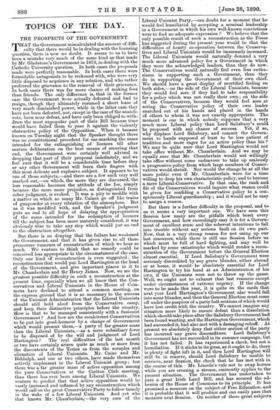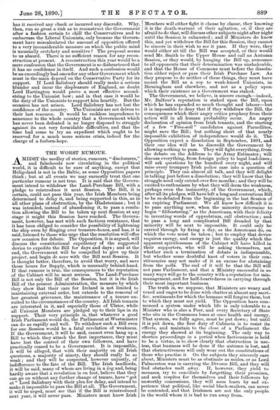TOPICS OF THE DAY.
THE PROSPECTS OF THE GOVERNMENT. THAT the Government miscalculated the amount of diffi- culty that there would be in dealing with the licensing question, there is now no doubt. It seems to us to have been a mistake very much of the same kind as that made by Mr. Gladstone's Government in 1873, in dealing with the Catholic University question. In both cases the proposals made were perfectly reasonable. In both cases there were formidable antagonists to be reckoned with, who were very little disposed to acquiesce in any solution, and who rather preferred the grievance to the removal of their grievance.
In both cases there was far more chance of making foes than friends. The only difference is, that in the former case the Government were actually defeated and had to resign, though they ultimately resumed a short lease of very much diminished power, while in the latter case they have not been defeated, nor, except in the case of the snatch- vote, been near defeat, and have only been obliged to with- draw the most unpopular part of their Bill because time would have failed them to pass it against the violently obstructive policy of the Opposition. When it became known on Tuesday night that the Speaker thought there was no constitutional precedent for ear-marking the sums intended for the extinguishing of licences till after mature deliberation on the best means of securing that end, the Government were certainly well advised in dropping that part of their proposal indefinitely, and we feel sure that it will be a considerable time before they or any other Government will burn their fingers with this most delicate and explosive subject. It appears to be one of those subjects,—and there are a few such very well marked out,—on which, the more they are discussed, the less reasonable becomes the attitude of the foe, simply because the more mere prejudice, as distinguished from sober judgment, is evoked. It was a pity to meddle with a matter on which so many Mr. Caines go off like trains of gunpowder at every vibration of the atmosphere. But as it was meddled with, and the Speaker's judgment puts an end to all hope of delaying the appropriation of the sums intended for the redemption of licences till the subject has been more maturely considered, it was obviously wise to take any step which would put an end to the obstruction altogether.
But there is no denying that the failure has weakened the Government, and that it has given rise to all these premature rumours of reconstruction of which we hear so much. We venture to think that no remedy could be conceived less appropriate to the circumstances of the case. Only one kind of reconstruction is even suggested : the reconstruction that would put Lord Hartington at the head of the Government, and give important places in it to Mr. Chamberlain and Sir Henry James. Now, we see the greatest possible difficulty in such a reconstruction at the present time, especially when we all know that the Con- servatives and Liberal Unionists in the House of Com- mons have declined to attend a common meeting, on the express ground that it is so necessary to the success of the Unionist Administration that the Liberal Unionists should still hold aloof from the Conservative camp, and keep their distinctive principles before the country. How is that to be managed consistently with a fusionist Government ? And how are the recalcitrant Conservatives to be put into good-humour by a change of Government which would present them,—a party of far greater mass than the Liberal Unionists,—as a mere subsidiary force to be disposed of by the will and judgment of Lord Hartington ? The real difficulties of the last month or two have certainly arisen quite as much or more from the discontents of the Tories as from the scruples and alienation of Liberal Unionists. Mr. Caine and Mr. Biddulph, and one or two others, have made themselves actively unpleasant in the Liberal Unionist group ; but there was a far greater mass of active opposition among the pure Conservatives at the Carlton Club meeting, than there has ever been among Liberal Unionists. We venture to predict that that active opposition would be vastly increased and inflamed by any reconstruction which would call on the great Conservative Party to follow tamely in the wake of a few Liberal Unionists. And yet who that knows Mr. Chamberlain,—the very core of the Liberal Unionist Party,—can doubt for a moment that he would feel humiliated by accepting a nominal leadership. in a Government in which his own well-known convictions• were to find no adequate expression ? We believe that the only possible result of such a reconstruction as the Time& has suggested during the present year would be that the difficulties of hearty co-operation between the Conserva- tives and Liberal Unionists would be immensely increased.. The Liberal Unionists would. naturally demand a very much more advanced policy for a Government in which they were the acknowledged leaders, than they do now.. The Conservatives would naturally feel even less enthu- siasm in supporting such a Government, than they- do in supporting the Government of their own chief.. We should have a great display of mortified feeling on both sides,—on the side of the Liberal Unionists, because they would. feel sore if they had to take responsibility for a policy which was not really their own ; on the side of the Conservatives, because they would feel sore at seeing the Conservative policy of their own leader snatched out of his bands and placed in the hands of others to whom it was not exactly appropriate. The moment is one in which nobody supposes that a very much more Liberal policy than Lord. Salisbury's could. be proposed with any chance of success. Yet, if so,. why displace Lord Salisbury, and commit the Govern- ment to hands supposed at least to be less patient of tradition and more eager for an active policy than his ? We may be quite sure that Lord Hartington would. not take office without Mr. Chamberlain. And we may be equally sure that Mr. Chamberlain would not willingly take office without some endeavour to take up zealously- a progressive policy from which large numbers of Conser- vatives would shrink. Nor would the change be at all the more politic even if Mr. Chamberlain were for a time willing to drop his own characteristic policy, and to become a mere Liberal-Conservative. In that case, the rank and file of the Conservatives would inquire what reason could be given for confiding a Conservative policy to a con- spicuously Liberal guardianship ; and it would not be easy to assign a reason.
But there is a further difficulty in the proposal, and to us it seems a very important one. We have seen this• Session how many are the pitfalls which beset every Government, and how exceedingly easy it is for a Govern- ment of excellent sense and the soberest intentions to fall. into trouble without any serious fault on its own part. Now, that is a very strong reason for not using up our last resources, while there is still one Session before us which must be full of hard. fighting, and may well be marked by some catastrophe which would render a recon- struction of the Government before the General Election almost essential. If Lord Salisbury's Government were seriously discredited by any grave blunder, either abroad or at home, it would be absolutely essential for Lord Hartington to try his hand at an Administration of his own, if the Unionists were not to throw up the game.. Well, we ought not to exhaust that last resource except under circumstances of extreme urgency. If the change were to be made this year, it is quite on the cards that next year Lord Hartington's Government also would fall into some blunder, and then the General Election must come off under the auspices of a party both sections of which would. have lost credit with the country. We cannot imagine any situation more likely to ensure defeat than a dissolution which should take place after the Salisbury Government had been found wanting, and the Hartington Government, which had succeeded it, had also met with a damaging rebuff. At present we absolutely deny that either section of the party- has incurred any grave discomfiture. Lord Salisbury's Government has not succeeded in its summer campaign, but it has not failed. It has experienced a check, but not a. humiliation. If it sticks to its guns, as it ought to do, there is plenty of fight left in it, and then Lord Hartington will still be in reserve, should Lord Salisbury be unable to retrieve, next Session, the check that he has met with in the course of this. Mr. Lincoln's rule not to swap horses while you are crossing a stream, eminently applies to the present situation. The Government has undertaken to pass a great Irish Land Bill, and has secured the ad- hesion of the House of Commons to its principle. It has promised a measure on the subject of Free Education, and it is probable that it will produce and can easily pass that measure next Session. On neither of these great subjects has it received any check or incurred any discredit. Why, then, run so great a risk as to reconstruct the Government after a fashion certain to chill the Conservatives and to embarrass the Liberal Unionists, only because the Govern- ment have miscalculated the amount of opposition offered to a very inconsiderable measure on which the public mind is unusually crotchety and sensitive ? The proposal seems to us absurd. There is no sufficient reason for any recon- struction at present. A reconstruction this year would be a mere confession that the Government is so disheartened that it has no confidence in itself. And such a confession would be an exceedingly bad omenfor any other Government which must in the main depend on the Conservative Party for its support. If Lord Salisbury should. really make a serious blunder and incur the displeasure of England, no doubt Lord liartington would prove a most effective second- string to the Unionist bow; and in that case it would be the duty of the Unionists to support him heartily. But the occasion has not arisen. Lord Salisbury has not lost the confidence of the country. The Unionists are not driven to their last resource. It would be reckless imprudence to announce to the whole country that a Government which has never been defeated is no longer disposed to struggle against its not very formidable difficulties, and that the time had come to try an expedient which ought to be reserved for a much more serious crisis, indeed for the charge of a forlorn-hope.



















































 Previous page
Previous page